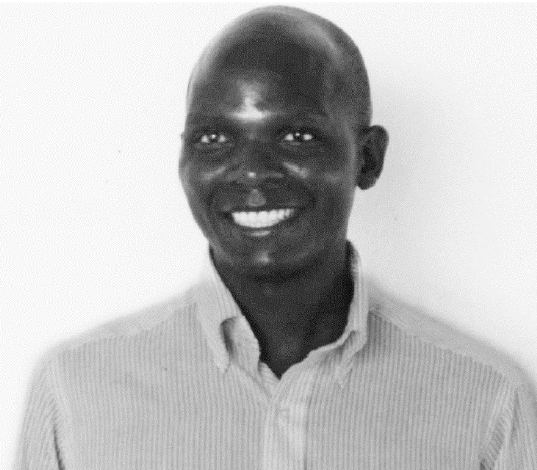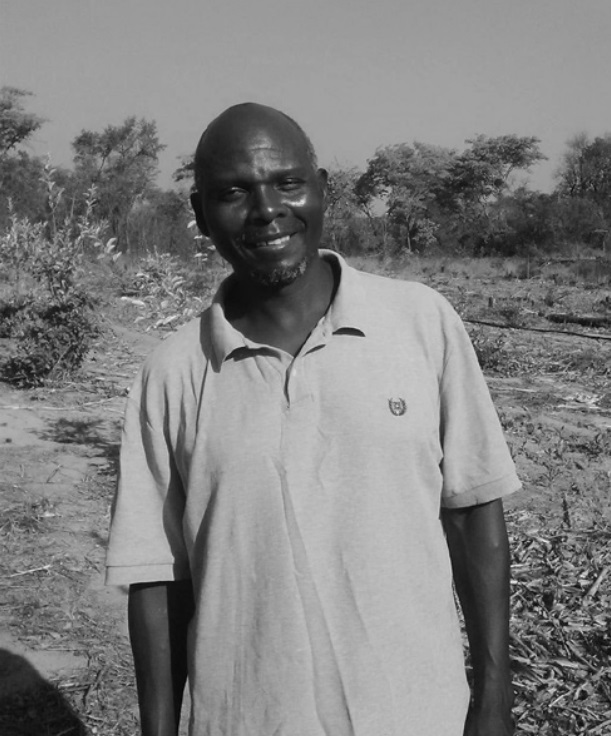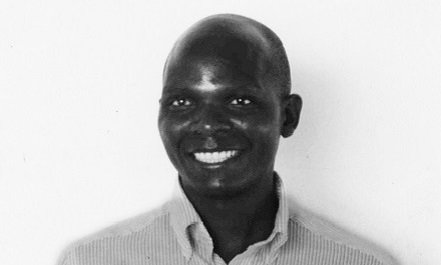Rescued by the Grace of God – Cuthbert Dzingirai

Painful yoga, endless meditation before candles, hours of labor, empty fasts and undue emphasis on community life that diminished individuality, made me realize that I had joined one of the strictest religious orders for priests. When I joined the order, I was not aware of the differences between secular and regular clergy in the Roman Catholic Church.
Required to Become Catholic
My family was not Catholic when I was born in late 1965, and we moved to a home on a farm around Gokomere Mission in Zimbabwe. I am the fourth in a family of four boys and two girls and was named Chiomberegwa, which means The Honored One. As soon as we moved to the farm, I was baptized Cuthbert and my family became Catholics. This was a requirement to settle at the mission and be employed by the church.
Church attendance was also compulsory. Our parents had to send us to every church function; there was little distinction between church and family life. At times church gatherings even caused a cancellation of primary through secondary school activities. As a first grader I could not see a difference between home, church, and school because Sr. Paula and other church figures were so often standing in front of us. The head of the primary school was a nun and the head of the high school was a priest. Religious brothers or sisters made up most of the staff in the schools.
As I got older, I wanted to become a Diocesan or secular priest. I was really discouraged when there was no place for me at the Regional Major Seminary. I ended up joining a religious congregation to be a regular clergy. Only after I was in my fourth year as a second year novice at Gandachibvuva Mission did I understand the difference. Secular clergy have more emphasis on academic training and are assigned to serve in a parish within a particular diocese. Order or regular clergy live in communities, have rigidly scheduled days with long periods of meditation and extensive spiritual training. The Order of Friars Minor, which I had joined, was one of the strictest in the austerity of its compulsory practices.
Specialized Training
Novitiate is a location away from the daily activities of ordinary life where training continues under the watchful eye of a Novice Master for an average of two years. First Profession follows this training before the bishop of the three evangelical counsels of poverty, chastity, and obedience. Juniorate follows the First Profession and is usually a period when one is to make final decisions with the recommendations of all previous formators and with the help of advisors. In juniorate, each day with all humility, I reflected on and re-examined my vocation. The three vows I had made to my superiors and the Church were always part of my “mantra,” which I repeated over and over each morning as I woke up for meditation. They became my most pampered treasures, part of the important sacramentals, which separated me from the laity. I thought they brought me closer to God.
By the time I became a scholastic, I was more religious and zealous about the Church than when I first entered the order of St. Francis. Two years of being exposed to long and convincing lectures on Mariology, canon law, religious life and prayer made me more personally connected to the Catholic faith. Little Catholic doctrine was clear to me as a Catechumen, but vague principles taught to me in catechism class became clear during the years of religious formation. I developed a stronger devotion to Mary and would say the rosary even more than was required. I was truly religious, but far from God.
Most of the Church’s teachings became part of my life. I believed that I had found my home in the Roman Catholic Church. The novitiate helped me continue to develop a personal relationship with the Church. A brief exposure to apologetics during my Postulancy helped me articulate the faith in a more informed way.
The most interesting part of my formation was my studies during the scholastic years. For a Catholic to be fully involved in the life of the Church, he had to participate in six of the seven sacraments: Baptism, Confession, Holy Communion, Confirmation, Ordination, Marriage and Extreme Unction. Although not explicitly taught, the Sacrament of Ordination is regarded as having the highest qualities and being the richest in grace. In my heart, I boasted that it was added to my other sacraments and vows. I was, therefore, confident that I could act as God with this sacrament that put my seat next to Christ. I was a holy man, so I thought. I believed as the Apostle Paul once did, that I was fully qualified by my training and position. But like Paul, I was to be convicted by the Holy Spirit through the Scriptures.
Reality Starts to Kick In
Not long after my final profession I began to see some of the ugly realities of the Church and myself. Little by little, I discovered how difficult it was to keep the evangelical counsels, especially chastity. I learned that some of my seniors bought houses in the names of their relatives, some even in the names of their children. Was this possible—avowed “celibates” with children?
These discoveries weakened my grip on the evangelical counsels. Before, I was zealous, committed to the Church’s teachings, deeply rooted in the Decrees of Vatican II. Now it was like the whole world was collapsing before me. How could so many inconsistencies coexist in the church of God? How could the most Holy Synod of Bishops overlook such practices of extreme hypocrisy? How could the Holy See? Together with friends in my order who were even more exposed to some of these misdeeds, I decided to survive in a personal way by minding my own business, which we had been taught to do in the Novitiate. However, during a visit to one of our stations, I found myself getting involved with a girl. I tried to resist by saying the rosary more often and confessing to my superior, but I failed.
“Ill-Conceived”
Early in 1997, my lover brought me crippling news that shook my vocation. I nearly committed suicide. My spiritual director advised me to take the “safe” route by denying responsibility—a decision I changed when the baby was born. He was my son! I was torn in two and my vocation was bland. My religious life was hypocrisy. I had nothing to boast about any more. My holiness was gone; I was no more a virgin! I was convinced that the Lord would not accept me in this state or even associate with me. I confessed to my superior and was forgiven by him, but I was guilty before God. My spiritual advisor told me to continue with my religious hypocrisy. But, I could not. I was desperate to escape from this burden of guilt and shame.
Day after day I participated more and more vigorously with a penitent heart in morning meditation, the Mass, Friday adoration hour and prayer before the Monstrance.
What else could I do since I was taught that cleansing myself was my responsibility? I tried harder and harder.
Little did I know that King David, “a man after God’s own heart,” after committing a similar sin, never thought the way I had been taught to think. He did not look for a “Father Superior” to whom to confess his sins. Nor did David go around trying to appease the Lord through good works or causing any pain to his body. Instead, he went directly to his Father in heaven, confessed his sin and prayed: “Have mercy on me O God according to thy loving-kindness; according to the multitude of thy tender mercies blot out my transgressions” (Psalm 51:1). I did not know that a person who has believed on Jesus Christ as his Savior could have direct dialogue with God the Father without human mediators. “Even as David also describeth the blessedness of the man, unto whom God imputeth righteousness without works, Saying, Blessed are they whose iniquities are forgiven, and whose sins are covered” (Romans 4:6, 7). This biblical truth was unknown to me in the Order of Friars Minor.
Facing My Responsibilities
Troubled by my conscience for about a year, I decided to seek advice outside the Catholic Church. A monthly publication I came across “by chance” changed my mindset at a time when I was living such a hypocritical life that I was left with nothing to defend. I did not know the Gospel; I was without saving grace. I thought the Good News was that I could be restored to my earlier condition of chastity. The article I read, “An Open Letter to the Church at the Time of Ecumenism” intelligently exposed the falsehoods of Catholic teachings and the deception of ecumenism. Although I did not really understand the content, it had stirred me to write to the author and share the problems that were bothering me. Even after the author had struggled to explain the truth of the finished work of Jesus; the purpose of Jesus’ suffering to take our sins upon Himself on the cross and make it possible for man to be reconciled to God, my motive continued to be to merit God’s favor. After we did a few Bible studies together, he helped me make a decision to join both the woman who would become my wife, and my child.

Coming to True Faith
It is difficult to express in words exactly how I felt when these truths of the Cross were eventually revealed to me right from my own Bible. Admitting that I had dedicated my life for over ten years to a cause that had no meaning would have been very difficult if it were not for the joy that I now had in my heart. As I studied the Word of God with the man God brought into my life through an article, I felt as though scales were falling from my eyes. It was as if I were waking up to reality from a deep sleep.
Almost every Monday throughout 1999, I would phone him to ask a question or just to pray with him. Then I would embark on a personal study of the Bible and the verses he had given me. It took me nearly a year to understand the meaning of such verses as: “For as many as are of the works of the law are under the curse…” (Galatians 3:10) and “The just shall live by faith” (Galatians 3:11). I never knew that God could love me and extend grace to me in a state of sin. The apostle Paul spoke the truth when he said, “…while we were yet sinners, Christ died for us” (Romans 5:8). I never before knew that God could love me and look upon me as “just” before Him because of my faith in Christ’s perfect work of atonement while I was in a state of sin. This was extraordinary—knowing that God justifies not by works that I do, but by faith in Jesus Christ. “To him that worketh not, but believeth on him that justifieth the ungodly, his faith is counted for righteousness” and “…with the heart man believeth unto righteousness” (Romans 4:5; 10:10).
Paid in Full by Christ Alone
Jesus Christ completely fulfilled the law; He fully paid my sin debt. I was not credited with this payment for my sin until I had faith in Christ alone and in His all-sufficient death on the cross, burial, and resurrection for my salvation. This is also true for every genuine believer because the righteousness of God is imputed to everyone who believes in the perfect work of His Son on the cross (Romans 3:22). “For Christ is the end of the law for righteousness to everyone that believeth” (Romans 10:4). In the Lord Jesus Christ, believers have righteousness without spot or blemish, perfect and all glorious; a righteousness, which not only expiated all their sins, but satisfied every requirement of the law’s precepts.
In my training in the Roman Catholic Church, I had been taught that salvation is a transfusion of Christ’s righteousness by the sacraments. I know now this is not true. God’s Word tells me that righteousness is directly credited to my account when I believe in Jesus Christ. A material, physical thing (a sacrament) cannot give spiritual life—no matter how mysteriously it is presented. God tells us, “It is the spirit that giveth life; the flesh profiteth nothing. The words that I speak unto you, they are spirit, and they are life” (John 6:63).
Roman Church Contradicts Scripture
So strong is Catholic teaching about the sacramental system that an eternal curse is put on anyone who does not accept this dogma. “If anyone says that by the sacraments of the New Law grace is not conferred “ex opere operato,” but that faith alone in the divine promise is sufficient to obtain grace, let him be anathema.” This means cursed or excommunicated from the Church and without hope of reaching heaven. The Catholic Church’s reason for such a curse on those who hold to “justification by faith alone” is logical because of what she refuses to concede. For her, justification is not an immediate declaration of God or received by faith alone; rather, she teaches that grace is conferred through her sacraments. Thus she is able to make a place for herself as a necessary means through which inner righteousness is given. In her sacraments she continually contradicts the simple truth of Scripture, “For by grace are ye saved through faith; and that not of yourselves: it is the gift of God: Not of works, lest any man should boast” (Ephesians 2:8, 9).
Things are Different Now
My life as a believer is also in complete contrast to the seven years I spent in the Order. As a believer, I know that Jesus Christ loves me and that He is always with me. When I am faced with uncertainties, I always believe He is there for me. In the Order, every need is supplied at its right time. Four square meals are guaranteed each day. The faithful are always there to throw something around you to keep you warm during winter and you can go for months, even years, without knowing the price of most basic commodities. An appeal is made to the diocese to provide all the answers to our problems. Now for me, it is a different thing altogether. I now trust God for everything. I have learned, by the grace of God, to thank Him for everything, even in the most adverse of situations. My desire is to see God in suffering, as well as joy, as I go through the difficulties of starting a new life.
I do not understand all the reasons for my fascination with Christ, but I know that He will continue to reveal Himself to me. What I already have, the life I now live in His grace, and being united with my family, is sufficient to move me forward to serve Him. He loved me not for anything in myself—I was a sinner like every person apart from Christ. He saved me not because I deserved it, because like all men, I deserved hell. Yet, God the Father declared me righteous the moment I put my faith in His Son, and this remains my position before Him even when I sin. What “great” news! How amazing—that while I was yet a sinner, He should die for me.
The Deceitfulness of Ecumenism
After about a year of study, prayer and preparation, I believe that the Lord is directing me to reach out to the one billion plus people imprisoned in the devil’s false salvation of Roman Catholicism. However, my newly found fellowship with believers also presents great discouragement. While I can clearly perceive the unfathomable gulf between the Roman Catholic Church and the true Church of Jesus Christ, I have come to realize, with dismay, that most of my brothers and sisters in Reformed and Evangelical circles see very little or no difference at all!
It terribly saddens me that while I, and many others who have left the Catholic Church, sacrifice everything, including relationships with family, prestige, and social security, for the sake of the very truth that the Roman Catholic Church opposes, other believers embrace Catholics as “brothers in faith.” They fail to understand, as I once did, that without hearing and believing the true gospel, Catholics are doomed to eternal damnation. Even more disturbing is the signing of the “Evangelicals and Catholics Together” document by some Evangelical leaders. What a mockery to the blood of Christ and of the 14th century reformers upon whose sacrifices the Reformation stands! How can we tread the path of truth in an adulterous unity through this worldly ethic of expediency under the guise of unity? In so doing we deny the true gospel and the Lord who redeemed us. “But there were false prophets also among the people, even as there shall be false teachers among you, who secretly shall bring in destructive heresies, even denying the Lord that bought them, and bring upon themselves swift destruction” (2 Peter 2:1).
The Catholic Church—Uncooperative
For most of my life I never knew that my salvation was entirely God’s design. I had not seen this truth through all my years of reading and study under Roman Catholic teaching. My Catholic teachers and superiors had neither taught me the true gospel nor led me to Christ. Rather, they had led me to themselves and to the false belief that they were my saviors and the dispensers of salvific grace.
In preparing this testimony, documentation of my priesthood was required. I neither anticipated this need when I started my new life in Christ, nor could I have anticipated how difficult it would be to obtain my records. After phoning Fr. Gava, Dean of the Cathedral house where I had lived and where my records would have been available, I was told that I should come to collect my papers.
When I arrived at the house, the men I had formerly lived with fed me but acted like I was a stranger. Fr. Gava was nowhere to be found. Three hours later he called to ask if I were there; however, I never spoke with him or saw him that night or the following day. Communication was controlled and my attempts to make inquiries were shunned even by those who were so recently family to me. When only insult and shunning were the result of a costly journey I had been directed to take, it became evident that letters of correspondence with the Bishop, found in my books at home, would have to suffice as confirmation of my former position in the Catholic Church.
Now Jesus Christ provides the confirmation of my new position in Him. There is no documentation determined by man needed to testify to my new life. The living Spirit of God by Whom I was sealed at the moment I believed gives witness. “The Spirit himself beareth with out spirit, that we are the children of God” (Romans 8:16).

Going on With Christ
At present I meet with fellow believers to worship the Lord together on Sundays and to encourage one another to reach out more and more to Catholics. The Word of God directs us, and by His grace we prepare to share the Good News of salvation in Jesus Christ, especially with those who remain trapped in the deception of the Catholic Church. We also look to the many warnings in the Bible about false teaching and encourage one another to “earnestly contend for the faith” (Jude 3) that we may “not be ashamed before Him at His coming” (1 John 2:28). In all things with joy and confidence we are “Looking unto Jesus the author and finisher of our faith” (Hebrews 12:2).


